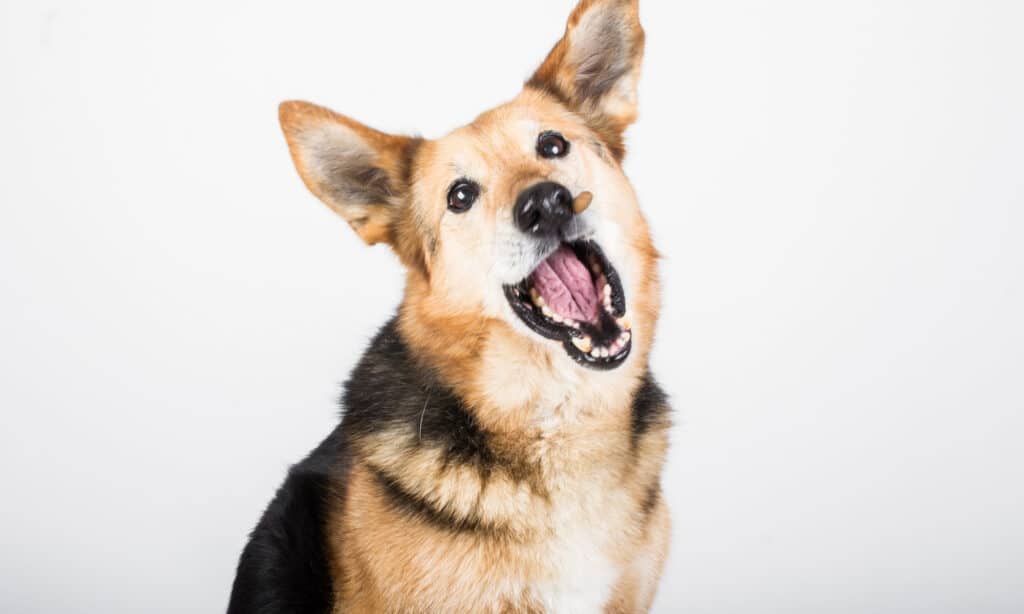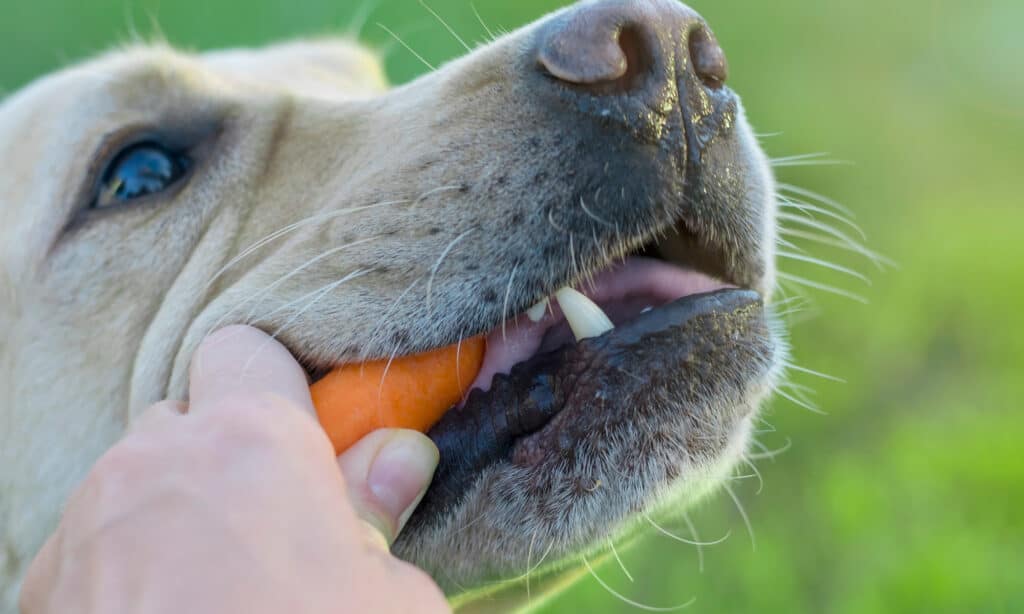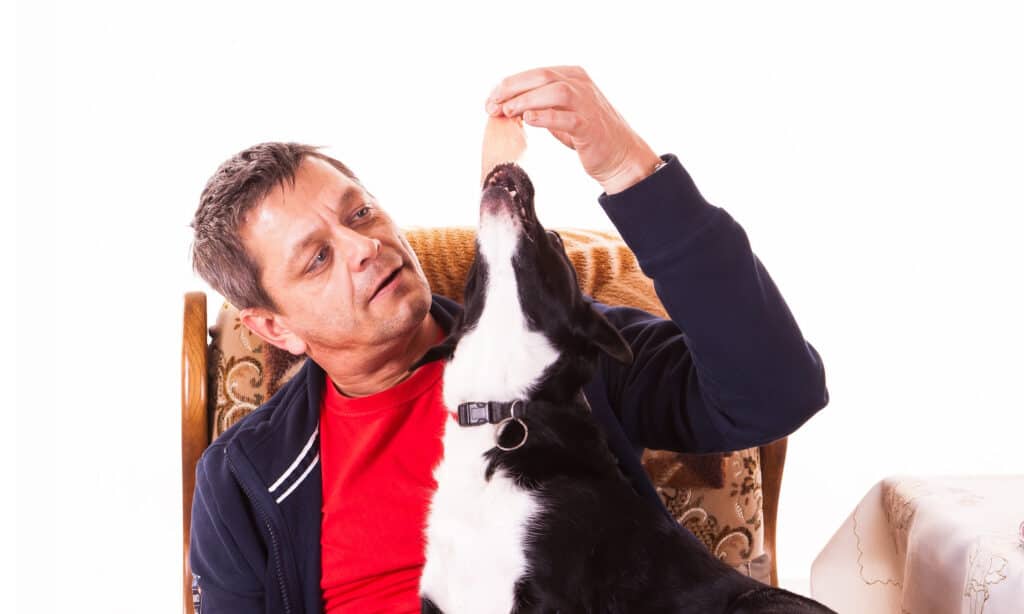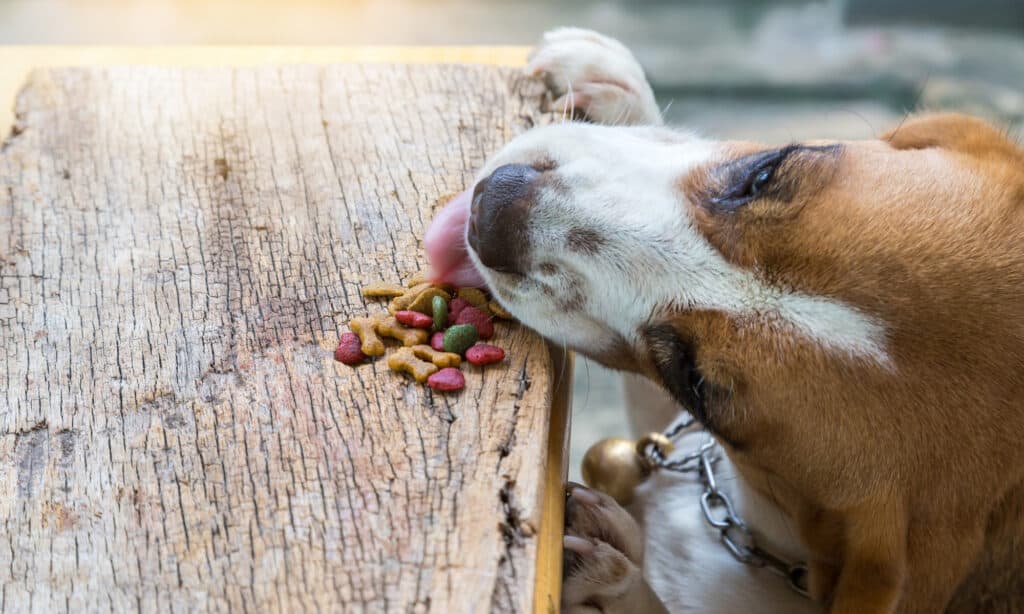As dog owners, we all want our furry friends to be happy and healthy. One important aspect of their health that often gets overlooked is their digestive system. A healthy gut is essential for your dog’s overall well-being, but digestive issues can be common and often indicate larger health problems. That’s why it’s important to understand how your dog digestive system works and what you can do to maintain its health.

In this comprehensive guide, we’ll take a deep dive into your dog’s gut health. We’ll cover the anatomy of their digestive system, how food is processed and broken down, and the importance of nutrient absorption. We’ll also explore common digestive issues in dogs, such as upset stomach, diarrhea, and constipation, and how to recognize when it’s time to see a vet. Finally, we’ll provide practical tips for maintaining digestive health in your dog, including proper diet and nutrition, hydration, exercise, and prebiotics and probiotics.
By the end of this guide, you’ll have a thorough understanding of your dog’s digestive system and be equipped with the knowledge to keep your furry friend’s gut healthy and happy. So, let’s get started!

Understanding Your Dog’s Gut Health: An Introduction
When it comes to our dogs’ health, we often focus on their physical fitness and overall well-being, but we may not realize the importance of their digestive health. A dog’s digestive system is vital for food processing, nutrient absorption, and a strong immune system.
To understand your dog’s gut health, it’s important to first understand the anatomy of their digestive system. A dog’s digestive system breaks down food, absorbs nutrients, and eliminates waste. The process begins in the mouth, where enzymes in their saliva begin to break down carbohydrates. The food then travels down the esophagus to the stomach, where stomach acid and enzymes further break down the food. From there, the partially digested food travels to the small intestine, where most of the nutrients are absorbed into the bloodstream. Finally, any waste products are eliminated through the large intestine and rectum.
Another critical aspect of your dog’s gut health is the gut microbiome, which is the collection of microorganisms that live in the digestive tract. These microorganisms play a crucial role in the digestion process, and they also help to maintain a healthy immune system. A diverse and healthy gut microbiome can help prevent issues like diarrhea and other digestive problems.
In the next sections, we’ll dive deeper into each aspect of your dog’s gut health, including the anatomy of the digestive system and the gut microbiome. By understanding how your dog’s gut works, you can take steps to ensure that they maintain optimal digestive health.
The Role of the Digestive System in Your Dog’s Health
The digestive system plays a crucial role in keeping your furry friend healthy and happy. It provides essential nutrients for growth, energy, and a healthy immune system. When the digestive system is working as it should, your dog can better ward off infections and illnesses.
However, a compromised digestive system can lead to a range of health problems. Symptoms such as diarrhea, vomiting, and constipation can indicate underlying health issues. Left untreated, chronic digestive issues can cause weight loss, malnutrition, and even more severe health problems.
Moreover, an unhealthy gut can also contribute to other issues such as skin allergies, autoimmune disorders, and behavioral problems. A poor gut health can cause anxiety and depression, as studies have found.
That’s why it’s vital to prioritize your dog’s digestive health. To maintain a healthy dog, provide a balanced diet, exercise, and support gut health. In the upcoming sections, we’ll dive into how you can take care of your furry friend’s gut health.

Breaking Down Digestion: An Overview of the Canine Digestive System
Sure, here’s a possible section on “Breaking Down Digestion: An Overview of the Canine Digestive System”:
Have you ever wondered how your dog’s food is processed and broken down? Understanding the anatomy and function of the canine digestive system can help you better care for your furry friend’s health.
The digestive process starts in the mouth, where the food is broken down into smaller pieces by the teeth and mixed with saliva, which contains enzymes that start to break down carbohydrates. Food travels to stomach, mixes with gastric juices and digestive enzymes to break it down.
Partially digested food goes to small intestine, where nutrients are absorbed into bloodstream. Tiny finger-like projections called villi line the small intestine, increasing the surface area available for nutrient absorption.
The large intestine is responsible for absorbing water and electrolytes from the remaining undigested food and eliminating waste. The rectum stores feces until it’s time for elimination.
It’s essential to note that dogs have a shorter digestive tract than humans, which means their food is processed and eliminated more quickly. Feed dogs high-quality, easily digestible food for essential nutrient intake.
How Food is Processed in Dogs: A Step-by-Step Guide
It’s important to know how your furry friend’s food is processed and broken down in their digestive system. Here’s a step-by-step guide to help you understand the process:
- Mouth: Food is chewed by teeth and mixed with enzymes in saliva, beginning the digestive process in the mouth.
- Esophagus: The food then travels down the esophagus, a long muscular tube that connects the mouth to the stomach.
- Stomach: Once in the stomach, the food is mixed with gastric juices and digestive enzymes that break it down further. The stomach also churns the food, which helps to break it down into smaller pieces.
- Small intestine: Partly digested food travels to small intestine, where nutrients are absorbed into bloodstream from stomach. The small intestine is lined with tiny finger-like projections called villi, which increase the surface area available for nutrient absorption.
- Large intestine: The large intestine is responsible for absorbing water and electrolytes from the remaining undigested food and eliminating waste.
- Rectum: The rectum stores feces until it’s time for elimination.
It’s important to note that the digestive process in dogs is different from that of humans. Dogs have a shorter digestive tract, which means their food is processed and eliminated more quickly.

Nutrient Absorption in Dogs: What You Need to Know
The small intestine absorbs most of the nutrients in your dog’s food and has villi that increase the surface area for absorption. The liver processes and distributes the nutrients throughout the body.
Nutrient absorption is critical for your dog’s overall health and well-being. A deficiency in essential nutrients can lead to a range of health issues, including poor coat condition, weakened immune system, and even developmental problems in puppies.
To ensure your dog is getting the nutrients they need, it’s essential to provide them with a balanced diet that includes all the essential nutrients, such as protein, carbohydrates, fats, vitamins, and minerals. Feed your dog a balanced, high-quality diet for optimal nutrient intake.
It’s also important to note that some factors can affect nutrient absorption, such as digestive problems or certain medications. If you suspect your dog is not absorbing nutrients properly, it’s important to speak with your veterinarian. They may recommend a specialized diet or supplements to ensure your furry friend is getting the necessary nutrients.

Common Digestive Issues in Dogs
While a healthy digestive system is essential for your dog’s overall health and well-being, digestive issues can be common and can indicate larger health problems. Symptoms such as vomiting, diarrhea, and constipation can be a sign of an underlying issue that requires veterinary attention. In this section, we’ll explore some of the most common digestive issues in dogs, including their causes, symptoms, and treatments, so you can be better equipped to care for your furry friend’s digestive health.
Upset Stomach in Dogs: Causes, Symptoms, and Treatment
An upset stomach, also known as gastroenteritis, is a common digestive issue in dogs. Gastrointeritis casues inflammation of the stomach and intestines causing vomiting, diarrhea, and abdominal pain.
The most common causes of upset stomach in dogs include dietary indiscretion (such as eating something they shouldn’t), bacterial or viral infections, and stress. Some breeds are also more prone to digestive issues, such as brachycephalic breeds, which have a shorter snout and may swallow more air when eating or drinking.
Symptoms of an upset stomach in dogs can include vomiting, diarrhea, loss of appetite, lethargy, and abdominal pain. In some cases, you may notice blood in your dog’s stool or vomit, which requires immediate veterinary attention.
Treatment for upset stomach in dogs may include fasting for 12-24 hours to give their digestive system time to rest and recover. After the fasting period, you can gradually reintroduce small amounts of a bland diet, such as boiled chicken and rice. It’s important to ensure your dog stays hydrated during this time, so be sure to provide plenty of fresh water.
If your dog’s symptoms persist or worsen, or if you notice any signs of dehydration (such as dry gums, sunken eyes, or lethargy), it’s important to seek veterinary attention. Your veterinarian may recommend additional treatment, such as medication to control vomiting or diarrhea, or antibiotics to treat an underlying infection.
Diarrhea in Dogs: What You Need to Know
Diarrhea is a common digestive issue in dogs that can range from mild to severe. It is characterized by loose, watery stools and can be caused by a variety of factors, including dietary changes, infections, parasites, and certain medications.
In many cases, diarrhea in dogs is mild and resolves on its own within a few days. However, if your dog’s diarrhea is severe, bloody, or accompanied by other symptoms such as vomiting or lethargy, it’s important to seek veterinary attention.
To help manage your dog’s diarrhea at home, it’s important to keep them hydrated. Be sure to provide plenty of fresh water, and consider offering a hydration solution like Pedialyte to help replace lost electrolytes. You can also try feeding your dog a bland diet, such as boiled chicken and rice, to help settle their stomach.
If your dog’s diarrhea persists or worsens, your veterinarian may recommend additional treatment, such as medication to control vomiting or diarrhea, or antibiotics to treat an underlying infection. They may also recommend diagnostic tests, such as a fecal exam, to determine the underlying cause of your dog’s diarrhea.
Preventing diarrhea in dogs involves providing a consistent, high-quality diet, avoiding sudden dietary changes, and ensuring your furry friend is up-to-date on parasite prevention. Regular veterinary checkups can also help detect and address potential health issues before they become more severe.

Vomiting in Dogs: Causes, Symptoms, and Treatment
Vomiting is a common digestive issue in dogs and can be caused by a range of factors, including dietary indiscretion, infections, motion sickness, and underlying health issues. It is characterized by the involuntary expulsion of stomach contents through the mouth. Symptoms of vomiting in dogs can include retching, drooling, and abdominal contractions. In some cases, you may notice your dog has a decreased appetite or is lethargic.
Treatment for vomiting in dogs may depend on the underlying cause. In some cases, fasting for 12-24 hours can help give the digestive system time to rest and recover. After the fasting period, you can gradually reintroduce small amounts of a bland diet, such as boiled chicken and rice. It’s important to ensure your dog stays hydrated during this time, so be sure to provide plenty of fresh water.
Preventing vomiting in dogs involves providing a consistent, high-quality diet, avoiding sudden dietary changes, and ensuring your furry friend is up-to-date on parasite prevention.
Constipation in Dogs: Causes, Symptoms, and Treatment
Constipation is a common digestive issue in dogs and is characterized by difficulty passing stools or infrequent bowel movements. It can be caused by a range of factors, including dehydration, dietary changes, lack of exercise, and underlying health issues such as an obstruction in the digestive tract.
Symptoms of constipation in dogs can include straining to defecate, passing small or hard stools, and a decreased appetite. In some cases, you may notice your dog has a bloated or uncomfortable abdomen.
Treatment for constipation in dogs may include dietary changes, such as increasing fiber intake or switching to a softer, more easily digestible food. Adding a stool softener or lubricant to your dog’s food can also help make it easier for them to pass stools. In some cases, your veterinarian may need to manually remove the feces from your dog’s colon.
Preventing constipation in dogs involves ensuring your dog stays hydrated and gets plenty of exercise. Providing a high-quality, nutritionally balanced diet can also help promote regular bowel movements.
Pancreatitis in Dogs: What You Need to Know
Pancreatitis is a serious digestive issue that can affect dogs. It is characterized by inflammation of the pancreas, which can cause symptoms such as vomiting, diarrhea, abdominal pain, and loss of appetite.
The pancreas is an important organ that produces enzymes to aid in digestion and hormones to regulate blood sugar levels. Inflammation of the pancreas can cause serious health problems, such as diabetes, kidney failure, and death.
The causes of pancreatitis in dogs can vary, but some common factors include high-fat diets, obesity, underlying health conditions such as Cushing’s disease, and certain medications. Certain breeds are also more prone to pancreatitis, including miniature schnauzers, Yorkshire terriers, and cocker spaniels.
Diagnosis of pancreatitis in dogs involves a combination of physical examination, blood tests, and imaging studies such as an ultrasound. Treatment may involve hospitalization, intravenous fluids, and medication to manage symptoms such as vomiting and pain.
Preventing pancreatitis in dogs involves providing a balanced, low-fat diet and ensuring your furry friend maintains a healthy weight. Avoiding table scraps and high-fat treats can also help reduce the risk of pancreatitis.

Maintaining Digestive Health in Dogs
Maintaining digestive health is essential for your dog’s overall health and well-being. A healthy digestive system ensures your furry friend is getting the nutrients they need to thrive, while also playing a critical role in maintaining a healthy immune system and preventing a range of health issues. In this section, we’ll explore some simple yet effective ways to maintain your dog’s digestive health, including tips for choosing a high-quality diet, promoting a healthy gut microbiome, and recognizing the signs of digestive issues. By prioritizing your dog’s digestive health, you can help ensure they live a happy, healthy life.
Proper Diet and Nutrition for a Healthy Gut in Dogs
The food your dog eats plays a crucial role in maintaining a healthy gut. A balanced and nutritionally complete diet can provide your furry friend with the necessary nutrients to keep them healthy and also supports their digestive system.
When choosing a diet for your dog, it’s important to select high-quality commercially available food that suits their age, breed, and activity level. The food should contain high-quality proteins, complex carbohydrates, and essential fatty acids. Avoid fillers, by-products, and artificial preservatives in dog food, as they can be hard to digest.
Feeding your dog at regular intervals is important as it helps them maintain their weight and prevents overeating. Overfeeding can lead to obesity, which is a risk factor for a range of health problems including digestive issues.
Supplements such as probiotics and prebiotics can also promote a healthy gut microbiome in dogs. Probiotics are beneficial bacteria that support digestive health and immune function while prebiotics are the fiber that feeds the good bacteria in your dog’s gut.
Hydration for Dogs: Why It’s Important for Digestive Health
Proper hydration is crucial for maintaining digestive health in dogs. Water is essential for transporting nutrients and eliminating waste from the body, and also helps regulate body temperature and support immune function.
Dehydration can lead to a range of health issues, including constipation, urinary tract infections, and even kidney failure. Signs of dehydration in dogs include dry mouth and gums, lethargy, and decreased urination.
To ensure your furry friend stays properly hydrated, make sure they have access to fresh, clean water at all times. In general, dogs should drink about one ounce of water per pound of body weight per day. During hot weather or increased activity, your dog may need more water to stay hydrated.
If you notice signs of dehydration in your dog, such as decreased urination or dry mouth, it’s important to provide them with water immediately and seek veterinary attention if the symptoms persist.
In addition to providing fresh water, feeding your dog a moisture-rich diet can also help promote hydration and support digestive health. Wet or canned food can be a good option, as it contains more moisture than dry food.

Exercise and Physical Activity for a Healthy Gut in Dogs
Regular exercise and physical activity are important for maintaining a healthy gut in dogs. Exercise can help promote regular bowel movements, reduce stress, and improve overall digestion.
In addition to promoting gut health, exercise also has a range of other health benefits for dogs, including weight management, improved cardiovascular health, and reduced risk of certain diseases.
The type and amount of exercise your dog needs will depend on their age, breed, and activity level. Most dogs need 30-60 mins of daily moderate exercise like walking, jogging, or playing fetch.
When exercising your furry friend, it’s important to keep them safe and avoid overexertion, particularly in hot or humid weather. Make sure they have access to plenty of water and take frequent breaks to rest and cool down.
In addition to physical exercise, mental stimulation can also help promote a healthy gut in dogs. Interactive toys and training can improve your dog’s mental health and reduce stress for a happier, healthier pup.
Prebiotics and Probiotics for Digestive Health in Dogs
Prebiotics and probiotics are two types of supplements that can promote digestive health in dogs. Probiotics are live bacteria that help to balance the good bacteria in the gut. Prebiotics are the fiber that feed the good bacteria and promote their growth.
You can find probiotics in certain foods like yogurt, kefir, and fermented vegetables, or as a supplement. It’s crucial to choose a high-quality probiotic supplement that includes strains of bacteria specifically targeted for dogs. Some common strains of beneficial bacteria for dogs include Lactobacillus acidophilus, Bifidobacterium bifidum, and Enterococcus faecium.
Prebiotics are in foods like bananas, chicory root, garlic, or as a dog-specific supplement. It’s important to start with a small amount of probiotics or prebiotics when introducing them to your dog’s diet, and gradually increase the dosage to avoid any potential digestive upset or diarrhea.
Incorporating prebiotics and probiotics into your dog’s diet can help promote a healthy gut and prevent digestive issues.

Signs Your Dog Needs to See a Vet for Digestive Issues
Digestive issues in dogs can range from mild to severe and can sometimes indicate an underlying health problem. Know when to seek veterinary care for your dog despite being able to manage some minor digestive issues at home.
Here are some signs that your dog may need to see a vet for digestive issues:
- Persistent vomiting or diarrhea: After 24 hours of vomiting or diarrhea, seek veterinary care for your dog. Prolonged vomiting or diarrhea can lead to dehydration and other health issues.
- Loss of appetite: Lack of interest in food or water for over 24 hours in dogs requires immediate veterinary attention.
- Abdominal pain: Signs of abdominal pain in dogs include whining, panting, and restlessness. If your dog is exhibiting these symptoms, it’s important to seek veterinary care.
- Blood in vomit or stool: The presence of blood in vomit or stool can indicate a range of health issues, including infection, inflammation, or injury to the digestive tract. If you notice blood in your dog’s vomit or stool, it’s important to seek veterinary care.
- Changes in behavior or mood: Digestive issues can sometimes cause changes in your dog’s behavior or mood, such as lethargy, depression, or irritability. If you notice any unusual changes in your dog’s behavior, it’s important to seek veterinary care.
By recognizing the signs that your dog may need veterinary care for digestive issues, you can help ensure they receive prompt treatment and prevent more serious health issues from developing. In the next section, we’ll explore some tips for preventing digestive issues in dogs.

Conclusion
In conclusion, maintaining digestive health in dogs is crucial for their overall health and well-being. A healthy gut can help prevent a range of health issues and promote optimal nutrient absorption and immune function.
To promote digestive health in your furry friend, it’s important to provide them with a healthy diet, plenty of exercise, and regular access to water. Incorporating prebiotics and probiotics into their diet can also help promote a healthy gut microbiome.
If you notice any signs of digestive issues in your dog, it’s important to seek veterinary care promptly. Early treatment can help prevent more serious health issues from developing.
By prioritizing your dog’s digestive health, you can help them live a happy, healthy life. We hope that this guide has been helpful in understanding the digestive system in dogs and providing you with tips for maintaining a healthy gut in your furry friend.
~Lindsie
